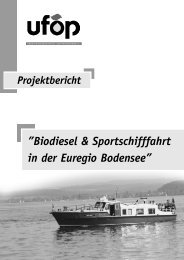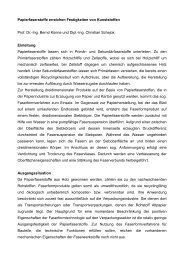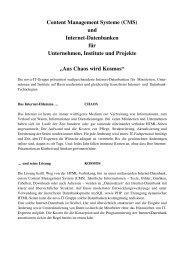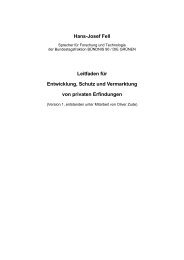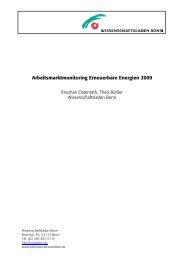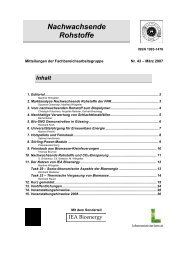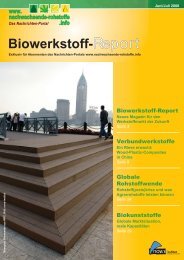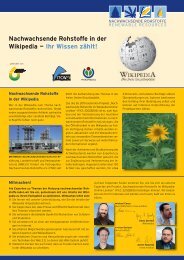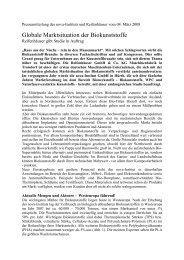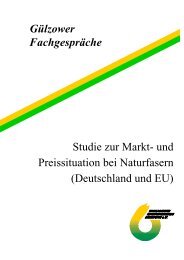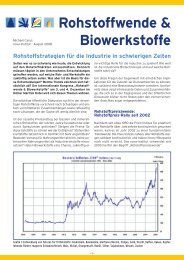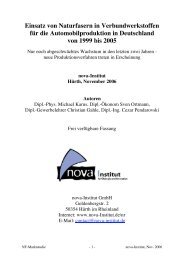Nachwachsende Rohstoffe - nova-Institut GmbH
Nachwachsende Rohstoffe - nova-Institut GmbH
Nachwachsende Rohstoffe - nova-Institut GmbH
Erfolgreiche ePaper selbst erstellen
Machen Sie aus Ihren PDF Publikationen ein blätterbares Flipbook mit unserer einzigartigen Google optimierten e-Paper Software.
Nr. 45 – September 2007<br />
<strong>Nachwachsende</strong> <strong>Rohstoffe</strong><br />
8. Biofuels Cities: Pure vegetable oil for engines<br />
Biofuel Cities Press Information<br />
As part of its aim to support biofuel stakeholders through the provision of information, the<br />
Biofuel Cities European Partnership presents a frank analysis of the perhaps most<br />
controversial biofuel, Pure Vegetable Oil (PVO), in the first issue of its Biofuel Cities<br />
Quarterly newsletter.<br />
In the world of biofuels, PVO has often been portrayed as a practical, yet problematic option<br />
to meeting the needs for transport biofuels and this is reflected in its widely varying uptake<br />
across Europe. For example, in France and Italy use of PVO is more or less prohibited, while<br />
in Germany and Austria, it is the fuel of choice for a fleet of approximately 10,000 vehicles.<br />
The primary arguments for the promotion of PVO as a fuel include the fact that it can be<br />
produced decentrally and it is immediately usable. Technology, also, has come to a level<br />
where vehicle modifications, necessary for emission reduction and engine protection, can be<br />
easily undertaken.<br />
However, as a result of biofuels recently high profile, discussion has been raised regarding<br />
emissions and engine compatibility. E.g., under certain test conditions, PVO generates<br />
unacceptably high levels of carcinogenic emissions. Still, when asked about this in the<br />
Biofuel Cities Quarterly interview, Dr. G. Gruber of the United Workshops for Plant Oil<br />
Technology stated that, “emissions from vegetable oil fuelled adapted engines are most<br />
probably less carcinogenic than emissions from diesel engines fuelled with conventional<br />
fuel”.<br />
Such controversies discussed show the relevance of PVO as a fuel, but also illustrate the<br />
various aspects under which biofuels must be analysed. These issues are examined in detail<br />
in Biofuel Cities Quarterly by experts in the field, in order to present a balanced perspective<br />
to all stakeholders interested in biofuels for transport. Each issue of this newsletter will focus<br />
on a different facet of biofuels production and use, as well as provide information on helpful<br />
publications and new events.<br />
The Biofuel Cities European Partnership is a forum for the application of biofuels. Open to all<br />
stakeholders, it offers a one-stop-shop for information on biofuels application; online facilities,<br />
workshops and study tours to exchange and network with your peers and learn from experts;<br />
news, publications and tools to provide information, guidance and support. Participants have<br />
full access to all features and participation is free. The Partnership was unofficially launched<br />
in August 2007 and 625 biofuels professionals and other interested stakeholders have<br />
already signed up. The official launch of the European Partnership will take place at the<br />
Clean Vehicles and Fuels Symposium in Stockholm this November.<br />
The Biofuel Cities European Partnership was created and is managed by the Biofuel Cities<br />
project, which aims to demonstrate the use of new and in<strong>nova</strong>tive biofuel technologies.<br />
Biofuel Cities covers the chain from feedstock to biofuels production, distribution and<br />
utilisation in vehicles. The project is co-ordinated by seven partners that share unique and<br />
extensive experiences on biofuels R&D&D and sustainable mobility, but also on the specific<br />
needs of local governments and private enterprise. It is supported by the European<br />
Commission under the EU’s Sixth Research Framework Programme.<br />
Information: secretariat@biofuel-cities.eu and www.biofuel-cities.eu<br />
10



